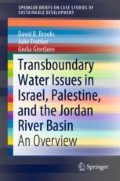Abstract
This chapter summarizes the status of water negotiations among the three nations of Israel, Palestine, and Jordan as they were to now and as they could be with a broader interpretation and understanding of the role of water in human society. They all have much to gain from reaching a formal, equitable and sustainable agreement, but even more to lose from continued conflict and disruption. Indeed, they could become a model for transboundary water management among (formerly hostile) nations elsewhere in the world.
The increasingly urgent reform of water allocation is challenged by the complexity of the political dimension, in particular the need to reconcile often competing objectives such as food and energy security and green growth.
Hellegers and Leflaive (2015, p. 273).
Access this chapter
Tax calculation will be finalised at checkout
Purchases are for personal use only
References
Bazza M, Kay M, Knutson C (2018) Drought characteristics and management in North Africa and the Near East. FAO, FAO Water Reports 45, Rome
Blomquist W, Ingram HM (2003) Boundaries seen and unseen: resolving trans-boundary groundwater problems. Water Int 28(2):162–169
Boelens R, Hoogesteger J, Swingedouw E, Vos J, Wester P (2016) Hydrosocial territories: a political ecological perspective. Water International 41(1):1–14
Brandes OM, Curran D (2016) Changing currents: a case study in the evolution of water law in western Canada. In: Renzetti S, Dupont DP (eds) water policy and governance in Canada. Springer, New York, pp 45–67
Brichieri-Colombi JS (2004) Hydrocentricity: a limited approach to achieving food and water security. Water Int 29(3):318–328
Gafny S, Talozi S, Al Sheikh B, Ya’ari E (2010) Towards a living Jordan River: an environmental flows report on the rehabilitation of the Lower Jordan River. Friends of the Earth Middle East, Amman, Bethlehem, Tel Aviv. http://foeme.org/uploads/publications_publ117_1.pdf
Grover VI, Krantzberg G (2015) Transboundary water management: Lessons from North America. Water Int 48(1):183–198
Hadi MA (ed) (2003) Water in Palestine: Problems, politics, prospects. PASSIA Publications, Jerusalem
Hellegers P, Leflaive X (2015) Water allocation reform: what makes it so difficult? Water Int 40(2):273–285
Ho S (2018) Introduction to special section: transboundary river cooperation: Actors, strategies and impact. Water Int 43(5):620–621
Megdal SB, Varady RG, Eden S (eds) (2013) Shared borders, shared waters: Israeli-Palestinian and Colorado River Basin water challenges. CRC Press/Balkema, Leiden, Netherlands
Sagive M et al (2012) Community-based problem solving on water issues: cross-border “priority initiatives” of the Good Water Neighbors Project. Friends of the Earth Middle East, Amman, Bethlehem, and Tel Aviv
Shuval HI (2007) Meeting vital human needs: Equitable resolution of conflicts over shared water resources of Israelis and Palestinians. In: Shuval HI, Dweik H (eds) Water resources in the Middle East: Israeli-Palestinian water issues—from conflict to cooperation. Springer, Berlin, pp 1–16
Shuval HI, Dweik H (eds) (2007) Water resources in the Middle East: Israel-Palestinian water issues—from conflict to cooperation. Springer, Berlin
Syme GJ, Nancarrow BE, McCreddin JA (1999) Defining the components of fairness in the allocation of water to environmental and human uses. J Environ Manage 57(1):51–70
Tal A (2002) Pollution in a promised land: an environmental history of Israel. Univ of California Press, Berkeley, CA, USA
Trottier J (1999) Hydropolitics in the West Bank and Gaza Strip. PASSIA Publications, Jerusalem
Wildeman J Tartir A (2019) Why cutting us aid will help Palestinians—and peace. Middle East Eye, 06 February 2019
Wolf AT (1999a) ‘Water wars’ and water reality: conflict and cooperation along international waterways. In: Lonergan S (ed) Environmental change, adaptation, and security (NATO ASI series vol 65). Kluwer Academic Press, Dordrecht, Netherlands
Wolf AT (1999b) Criteria for equitable allocations: The heart of international water conflict. Nat Resour Forum 23(1):3–30
Wolf AT (2000) From rights to needs: water allocations in international treaties. In: Feitelson E, Haddad M (eds) Management of shared groundwater resources: the Israeli-Palestinian Case with an international perspective. International Development Research Centre, Ottawa, and Kluwer Academic, Amsterdam, pp 27–59
Author information
Authors and Affiliations
Corresponding author
Rights and permissions
Copyright information
© 2020 The Author(s), under exclusive license to Springer Nature Singapore Pte Ltd.
About this chapter
Cite this chapter
Brooks, D.B., Trottier, J., Giordano, G. (2020). Moving Water from Last to First in the Peace Process. In: Transboundary Water Issues in Israel, Palestine, and the Jordan River Basin. SpringerBriefs on Case Studies of Sustainable Development. Springer, Singapore. https://doi.org/10.1007/978-981-15-0252-1_7
Download citation
DOI: https://doi.org/10.1007/978-981-15-0252-1_7
Published:
Publisher Name: Springer, Singapore
Print ISBN: 978-981-15-0251-4
Online ISBN: 978-981-15-0252-1
eBook Packages: Earth and Environmental ScienceEarth and Environmental Science (R0)

